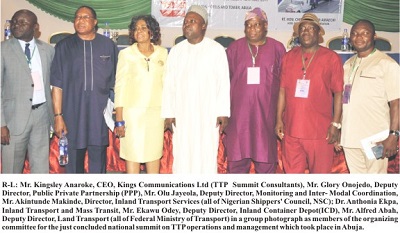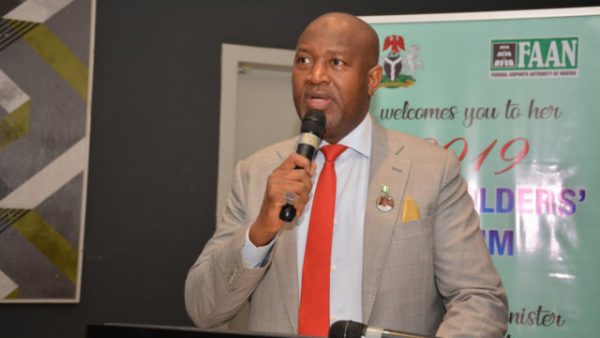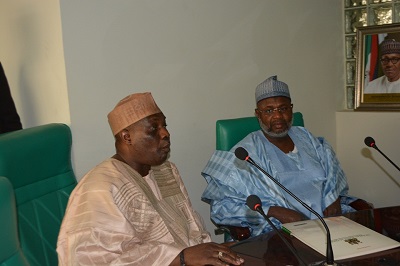No Plans To Fix Oshodi-Apapa Road – FG
- Ministry of Works under pressure to spread projects nationwide
- NSC to provide regulatory framework for TTPs
By Kenneth Jukpor
Despite assuring Apapa and Tin Can ports’ stakeholders of its readiness to solve the perennial problem by completing the rehabilitation of the Oshodi-Apapa dual carriageway, the Federal Government has no plans to fix the road.
During an exclusive chat with MMS Plus newspaper in Abuja last week, the Ministry of Power, Works and Housing revealed this while lamenting that the revenue for the road wasn’t captured in the Ministry’s 2017 budget.
However, the Director, Highway Planning and Development at the Transport Ministry, Engr. Chukwuwike Uzo who was speaking on behalf of the Minister, Mr. Babatunde Fashola at a two-day National summit on the “Establishment, Management and Operation of Truck Transit Parks in Nigeria”, also disclosed that the pressure from other zones and states in the country has equally forced the Ministry to diversify projects.
Engr. Uzo noted that the Lagos-Ibadan expressway and the Apapa-Wharf roads were laudable projects which have been highlighted by other States as sufficient projects for Lagos state.
Engr. Uzo also dismissed speculations that the ongoing reforms on the Apapa-Wharf road would stretch to the Oshodi-Apapa axis, especially the Tin-Can- Coconut stretch which has become characterized by gigantic pot holes, gullies and dirt.
“The budgetary allocation we are getting this year would determine what we can achieve, although, we have a plan but the Oshodi-Apapa is not in the budget. I have witnessed firsthand the challenge of transiting the road after spending over four hours on that axis in a traffic-jam after an event in Apapa.”
“In 2017 budget, there are six categories of priority and the roads leading to the ports are among the prioritized six. We may not be able to achieve all but whatever we don’t achieve in 2017; we would work towards it in 2018. Let’s see what will be allocated and how much we can accomplish and then we would see how to achieve that in 2018.
Speaking on the issue of spreading infrastructural projects across the country, Uzo said, “one of the problems we are facing is the complaints of the Ministry’s overemphasis on Lagos and South-West. People in other zones are lamenting that too much of the transport ministry budget is spent on Lagos. So, we are trying to have some kind of balance and pay attention to other states and zones. All the roads leading to Apapa port are bad but we are going to see how we can address them one at a time.”
“We are already working on the Lagos-Ibadan expresses way. However, even if we fix the Lagos – Ibadan road without tackling Oshodi-Apapa, we have not achieved anything because people can’t move their goods safely from the ports.”
In his reaction, the Chairman of the Association of Maritime Truck Owners (AMATO), Chief Remi Ogungbemi expressed shock as he recalled that during a recent meeting with Apapa port stakeholders, the Minister of Works claimed to have given the contract of Oshodi-Apapa road repairs to Julius Berger Construction Company.
“I remember vividly that during a recent port stakeholders’ summit on the Apapa-Wharf road, the Minister of Works, Mr. Fashola said that he has also given the contract of Oshodi-Apapa to Julius Berger and he promised that work on Tin-Can and the Apapa-Oshodi expressway would start immediately”, the AMATO Boss said.
Chief Ogungbemi maintained that the Federal Government must find a way to fix the Oshodi-Apapa because the level of damage was beyond measure. “I don’t call the Oshodi-Apapa route a road anymore, especially the Tin-Can axis; I refer to it as a death trap. More concentration should be given to this road because it leads to the two major ports in Nigeria (Tin-Can port and Apapa port)” he said.
He explained that Lagos State is a place where trucks and tankers always visit to lift solid cargo or petroleum products. “There should be concentration on Lagos because every other state contributes to the menace through their trucks and tankers. Since we have more trucks in Lagos, more attention should be given to the state.” Chief Ogungbemi argued.
Meanwhile, the Federal Government has encouraged state governments and private investors to fast track the process of developing Truck Transit Parks (TTP) across the country.
The Minister of Transportation, Mr. Rotimi Amaechi, made the plea during the opening ceremony of the national summit on TTP in Abuja last week.
“The Federal Government shall ensure that TTP projects independently developed by state governments and private investors meet a minimum standard in the number of facilities provided at such TTP sites. Government plans over the next couple of years to develop Truck Transit Parks at Lokoja in Kogi State, Obollo-Afor in Enugu State, Ogere in Ogun State, Jebba in Kwara State and Porto Novo Creek in Lagos.
Amaechi said that TTPs are an alternative strategy to address the menace of truck congestion at the seaports in Apapa and Port Harcourt. He commended the TTP projects in Ore Sunshine City, Ondo State and those being processed by the Kaduna State Government at Mararaban-Jos, Buruku and Tapa on the Kaduna -Abuja highway.
According to him, the Federal Government focuses on the diversification of the economy, the transportation of agricultural commodities and solid mineral resources from the hinterland to the ports and the haulage.
He stated that despite the neglect of the rail lines for about three decades, the increasing volume of trade and transit within and across the country’s borders, and increased patronage of Nigerian ports as transit port by landlocked neighbouring countries of Niger and Chad, road haulage remains a major means of long distance transportation of goods and TTPs were crucial to its successful operations.
“The high statistics of road accidents and loss of cargo occasioned by bad road is of concern to government. Environmental degradation is another negative impact of excessive usage of roads by heavy duty vehicles. It is to this end that the imperative of providing truck transit parks (also known as truck terminals/rest stops) comes to the fore necessitating the Federal Ministry of Transportation and the Nigerian Shippers’ Council to convene this National Summit”, he added.
On his part, the Executive Secretary of Nigerian Shippers’ Council (NSC), Mr. Hassan Bello, said “developing truck transit parks is the Council’s initiative for infrastructure change”.
Bello explained that Shipper’s Council wasn’t awarding contracts for building of TTPs, but creating the regulatory framework for TTPs to be developed across the nation.
“It is important to note that Shippers’ Council is not constructing any TTP, rather the Council is a promoter of this transport infrastructure. TTPs don’t exist in a vacuum; there must be standards. We are promoting a seamless transport centre that so one can easily know where to get trucks to move cargo. This must be a deliberate and coordinated policy.” Bello said.
He revealed that the Council was also talking with the NNPC, which would like to have its retail outlets in these structures. He also stated that the Council was working with other agencies of the government like the Federal Road Safety Corps, and others.
“TTPs will reduce pilferage and theft of cargoes, while on transit. It will also afford cargo owners the means to monitor the movement of cargoes through the cargo tracking system installed in the respective TTPs,” he added.
Bello said that the development of TTPs would be on Public-Private Partnerships (PPP) and commended the efforts of commercial banks that attended the summit. He also recognized the role of implementation in the operation of TTPs, highlighting the place of the Federal Road Safety Commission (FRSC), Vehicle Inspection Officers (VIO) and the Nigerian Police in the successful running of TTPs.
Explaining the importance of TTPs, the Director, Road and Mass Transit, Ministry of Transportation, Mrs. Anthonia Ekpa noted that TTPs when established would decongest the roads and reduce the havoc caused by truckers.
Ekpa described a Truck Transit Park as a place where trucks congregate from one part of the country to another, stating that truck drivers need to rest after several hours of driving.
“When a tanker driver drives for a long period of time without stopping, it usually results to accidents where trucks fall down and this has claimed several lives and causes damage to goods and properties on a daily basis. It is important for a driver to find somewhere and park to relax and have access to conveniences”, Ekpa said.
She said that TTPs would enable truckers to park and relax before embarking on their journeys.







